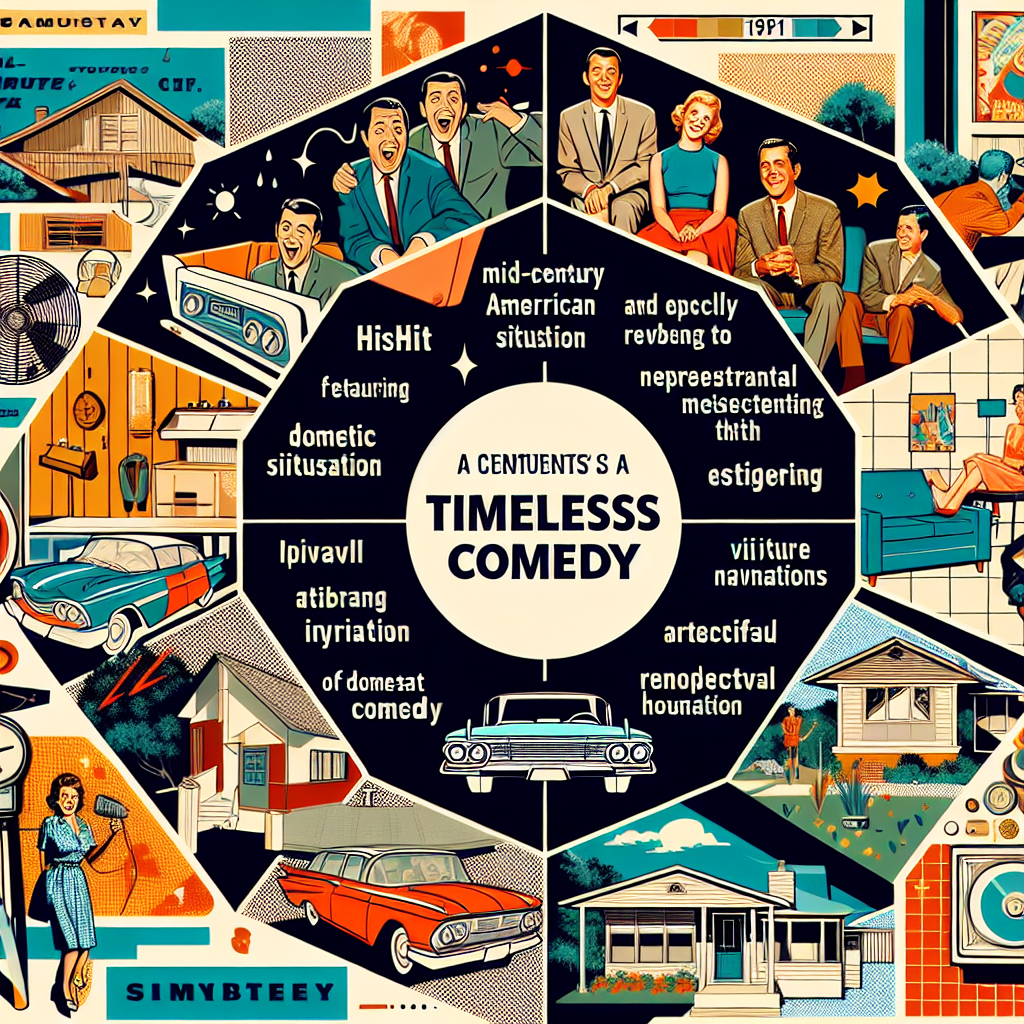The Dick Van Dyke Show: A Reflective Analysis
Introduction: A Pioneering Sitcom
"The Dick Van Dyke Show," which aired from October 1961 to June 1966, stands as a seminal work in the annals of television history. Created by Carl Reiner, the show not only launched the careers of its lead actors, Dick Van Dyke and Mary Tyler Moore, but also set a new standard for the sitcom genre. Set in both the professional world of a television comedy writer and his home life, the show adeptly balanced humor with intelligent storytelling, making it a template for many sitcoms that would follow.
Themes and Narrative Techniques
The cornerstone of "The Dick Van Dyke Show" is its rich blend of domestic and professional settings. The show is as much about Rob Petrie’s (Dick Van Dyke) challenges as a writer for "The Alan Brady Show" as it is about his relationship with his wife, Laura (Mary Tyler Moore), and their son, Ritchie. This duality allows the show to explore various facets of American life during the early 1960s, from gender roles and work-life balance to the burgeoning field of television entertainment.
One of the show’s key narrative techniques is its use of situational comedy derived from both workplace antics and domestic misunderstandings. The show’s humor is often rooted in the sharp writing and the physical comedy skills of Van Dyke, complemented by Moore’s impeccable timing and expressive performance. For instance, the episode “Coast to Coast Big Mouth” is renowned for its perfect blend of situational irony and character-driven humor when Laura accidentally reveals on national television that Alan Brady wears a toupee. Such episodes highlight the seamless merging of professional and personal storylines.
Character Arcs and Development
The characters on "The Dick Van Dyke Show" are its heart and soul, each bringing a unique dynamic to the ensemble. Rob Petrie is the quintessential everyman—talented yet bumbling, confident yet unsure—allowing audiences to see themselves in his predicaments. His comedic timing and ability to gracefully recover from physical stumbles render him a relatable and enduring figure.
Laura Petrie, portrayed by Mary Tyler Moore, represents a nuanced portrayal of a 1960s housewife. Unlike the often one-dimensional female characters of that era, Laura is smart, funny, and occasionally non-conformist. Her reluctance to wear pants in early episodes, which was a decision negotiated by Moore over time, was emblematic of the gradual shifts in women’s roles within the home and society. Laura’s character paved the way for increased complexity and depth in the portrayal of women on television.
The supporting characters, such as Rob’s co-workers Buddy Sorrell (Morey Amsterdam) and Sally Rogers (Rose Marie), and his boss Alan Brady (Carl Reiner), enrich the narrative landscape. Buddy’s penchant for quick one-liners and Sally’s status as a single, career-driven woman offer contrasting yet complementary perspectives on life and work in the 1960s.
Cultural, Social, and Historical Reflections
"The Dick Van Dyke Show" provides a snapshot of early 1960s America, a time marked by post-war suburbia, the rise of television as the dominant medium of entertainment, and evolving social norms. The show’s depiction of a nuclear family living in suburban New Rochelle reflects the idealized American dream of the era. Yet, it subtly addresses emerging social issues such as gender roles and the professional aspirations of women.
For example, Sally Rogers stands out as a character who defies the traditional expectations of women. Her presence as a single, professional woman in a male-dominated workplace offers viewers a progressive glance toward the feminist movements that would gain momentum later in the decade. Sally’s humor and resilience make her a beloved character who challenges the status quo without overtly politicizing the narrative.
Additionally, episodes like "That’s My Boy??" address social prejudices with a deft comedic touch. The episode initially misleadingly suggests that the Petries were given the wrong baby at the hospital, playing on racial stereotypes, only to culminate in a heartwarming twist that emphasizes shared humanity over superficial differences.
Legacy and Lasting Influence
The legacy of "The Dick Van Dyke Show" is profound and enduring. As one of the earliest sitcoms to blend professional and personal life storylines, it influenced many subsequent shows, from "The Mary Tyler Moore Show" to "Friends" and "30 Rock." Its innovative approach to humor, with a strong emphasis on character development and situational comedy, laid the groundwork for countless future sitcoms.
Moreover, the show has left an indelible mark on popular culture. Iconic episodes and scenes, such as Rob tripping over the ottoman in the opening credits, have become part of television lore. The show’s ability to address and reflect social changes while remaining fundamentally light-hearted and optimistic ensures its continued relevance and popularity.
Reflective Questions and Takeaways
As we reflect on "The Dick Van Dyke Show," several questions arise that remain pertinent to our contemporary societal landscape:
- How does the portrayal of gender roles in "The Dick Van Dyke Show" compare to those in modern television sitcoms?
- In what ways does the show succeed in balancing humor with meaningful commentary on social issues?
- How do the character arcs and narrative structures established in "The Dick Van Dyke Show" influence how we understand and consume contemporary television?
- What can modern content creators learn from the show’s blend of physical comedy and clever writing?
Ultimately, "The Dick Van Dyke Show" is more than just a relic of television history; it remains a vibrant, insightful, and influential piece of media that continues to offer valuable lessons on storytelling, character development, and cultural reflection. Its enduring charm and wit invite new generations to explore its episodes, ensuring that it remains an essential part of the television canon.
Got more questions? Our personalized TV Explorer AI assistant is here to help. Click here to start a conversation!
[Advertisement]
Want to see the deeper significance behind your favorite TV shows? Discover how ANY show relates to positive biblical principles with TV and Scripture GPT from BGodInspired.com. Click here to gain insights that go beyond the screen!
[Advertisement]

